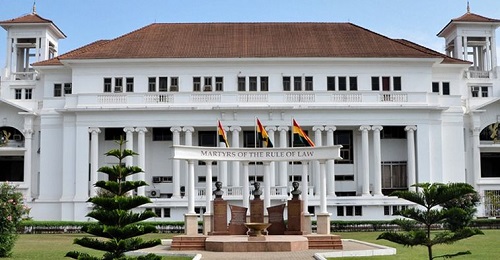The Supreme Court has clarified that the Numo Nmashie Family of Teshie in the Greater Accra Region cannot hold themselves as owners of 70 villages, which occupied over 72,000 acres of land.
In its latest clarification, a five-member panel of the apex court presided over by the Chief Justice, Justice Gertrude Araba Esaaba Torkornoo, affirmed that the Numo Nmashie Family of Teshie could not claim ownership of the land because a Court of Appeal’s decision in 1982 which declared them owners of the piece of land was based on fraudulent information presented to the court.
The court, therefore, directed the Lands Commission to expunge all registration and certificates issued to the Numo Nmashie Family of Teshie, and the Tetteh Olewolon Family, in respect of the 72,000 acres.
The court also directed that all third parties in possession and deriving title through the Numo Nmashie Family prior to the latest Supreme Court judgment were to attorn tenancy to the Boi Stool and relevant families.
Affected villages in Boi Stool v. Daniel Addo Quaye & Ors
The villages affected by the decision are Peduase, Obuom, Nsakye, Agyemanti, Brotrease, Danfa, Adoteiman, Otinibi, Malidzano, Okyrekomfo Kotei, Taboadidi, Ayim, Adenkrebi, Abefia, Ayimensa, Kweiman, Odonkorkurom and Kwadwokurom.
Others are Otiakurum, Otopram, Brekusu, Kponko, Dedekurom, Sesemi, Teiman, Papao, Ogbodzo, Adaman, Mpehuasem, Otinshi, Otanor, La- Bawaleshie, Tesa, Adjiringano, Okpoi Gonno, Manmormo, Oshiyie, Amanfro, Bobamase, Abokobi, Nyamekurom, Oyarifa and Ogoha.
The rest are Ajangote, Akpomang, Boi, Pantang, Sempene, Frafraha, Apenkwa, Abladdzei, Ankome, Ashonman, Agbogba, Adenta, Otuwa, Madina, Nkwantanang, Ashale-Botwe, Atwuo-Okuman, Martey Tsuru, Gbatsuma, Okpegon, Ablekuma, Odediben, Agbleshia, Alegon, Mangoase, Teshie and Kpeshie Ridge.
The clarification affirmed the Supreme Court’s judgment dated March 22, 2023, which had Justice Jones Victor Mawulorm Dotse, as the presiding judge.
Other members of the panel were Justices Issifu Omoro Tanko Amadu, Nene Abayateye Ofoe Amegatcher, Avril Lovelace-Johnson and Emmanuel Yonny Kulendi.
The judgment was delivered in favour of the Boi Stool and 13 others.
Read also: Supreme Court rules on 40-year land dispute
1982 Appeal
After the government procured the 25.031 acre land on the Adjancote Hill in 1966 through the Executive Instrument (E.I. 163), a State Lands Tribunal declared the Chief of Brekusu, Nana Adu Mireku Agyemang III, as being entitled to compensation against the Numo Nmashie Family and the Dowuona Family of Osu.
Dissatisfied with the decision of the Tribunal, the Numo Nmashie Family challenged the decision at the Court of Appeal in December 1982.
The decision of the tribunal was overturned by the Court of Appeal and declared the Numo Nmashie Family as the rightful family entitled to compensation.
The decision of the court was based on a survey done by a surveyor who told the court that the villages within the disputed area were occupied by members of the Numo Nmashie Family and that some villages had been established there.
The Numo Nmashie Family has since claimed to be owners of 70 villages, covering over 72,000 acres.
1999 suit
Following the appeal, the Mantse of Boi, Nii Narh Dowuona II, sued the grantees (Olewolon Family which had the Numo Nmashie Family as co-defendants), claiming 87.68 acres which had been alienated to the grantees.
The Mantse of Boi’s suit was dismissed on the grounds that the Numo Nmashie Family owned the over 87 acres of land.
The decision was based on the 1982 appeal.
Appeal
An appeal against the Mantse of Boi’s suit which was dismissed, was thrown out at the Court of Appeal in November 2004 and a further appeal at the Supreme Court was dismissed in June 2006.
Asserting ownership
Following the judgment in 2006, the Numo Nmashie Family started proclaiming to be owners of the 70 villages and caused the Executive Secretary of the Lands Commission to publish in the Daily Graphic to plot the judgment plan in respect of the 70 villages and families.
The families include La-Bawaleshie, Madina, Mpehuasem, Peduase and Abokobi, among others.
The Numo Nmashie Family again procured an order from the High Court to go into possession and demolition of properties on the land.
High Court judgment
But that resulted in resistance, leading to another legal tussle at the High Court.
The Boi Stool, through its lawyer, Prosper Xorla Nyahe, argued that the Numo Nmashie Family fraudulently procured the 1982 judgment, urging the court to set the judgment aside.
In a judgment dated March 8, 2011, the High Court ruled in favour of the Boi Stool and 13 others and upheld that the Numo Nmashie Family fraudulently procured the judgment.
That was because witnesses from villages captured as being part of the 70 villages the Numo Nmashie Family had claimed ownership of, had told the court they were not under the Numo Nmashie Family, a testimony that weakened the Numo Nmashie Family.
2011 Appeal
The Numo Nmashie Family then appealed the March 2011 judgment at the Court of Appeal.
The Court of Appeal reversed the March 2011 High Court judgment on the grounds that the Boi Stool and the 13 others had failed to establish evidence to support the claim of fraud and said it was bound by the decision of the 1982 judgment.
That judgment was, subsequently, set aside by the Supreme Court in an appeal filed by the Boi Stool and the 13 others against the Olewolon Family which had the Numo Nmashie Family as co-defendants.

